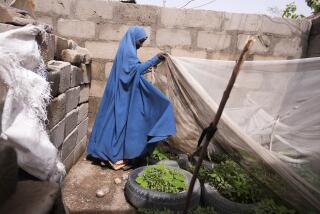Caught in the cycle of poverty
After months searching for work and feeling increasingly discouraged, Natalie Cole caught a break — an offer of a part-time position at a Little Caesars Pizza shop in Compton. The manager scheduled her orientation and told her she had to pass a food safety test.
She took the test — and failed. But rather than study and take it again, she shrugged it off.
“I guess I am not working for a reason,” she said.
PHOTOS: A life spent battling poverty
Cole isn’t a victim of the struggling economy. She was poor before and is poor now. Hers is a story of entrenched poverty — a whirl of choices, challenges and chaos that keeps undermining her spurts of personal progress.
Tracking Cole’s life over six months offers a messy and at times disheartening insight into vexing social policy questions: How do you break the cycle of generational poverty? Can or should society do more to change the trajectory of the young and poor?
Cole, 27, and her four children have moved nearly a dozen times in the last year while living on about $1,000 a month in public cash assistance and food stamps. She wants to provide a better life for her children but seems not to know how.
“I just know what I know,” she said. “All I can do is raise them.... They are going to make their own path in life.”
But if Cole doesn’t find a better way, chances are her children won’t finish school, hold steady jobs or stay healthy.
“Poverty is bad for kids,” said Harvard Kennedy School professor Kathryn Edin, who studies poverty policy. “It just makes everything a struggle.”
Children who are born into poverty and spend years that way are more likely to be teenage parents and remain poor as adults, according to the Urban Institute.
“Getting out of poverty takes extraordinary perseverance,” Edin said. “When disadvantage builds over generations, it is going to take generations to unbuild it.”
Cole, who has high blood pressure and diabetes, worries about the future but focuses mostly on the present as she moves from crisis to crisis.
::
Cole was raised by a single mother in Compton who worked off and on as a security guard. In her early teens, Cole started drinking and smoking pot, dropped out of school and got pregnant. At 17, she was raising two children: Peter, now 12, and Destiny, 10.
Her relationships with their fathers didn’t last. When she was 21, she met Juan Sena. He was kind and calm. The couple had two sons: Gemini, now 4, and Jaylyn, 2.
Last summer, Sena got laid off from his construction job. He receives some unemployment and earns a little money doing tattoos. Cole sometimes braids hair to earn a few extra dollars. But mostly, they rely on public assistance. Cole has learned not to be embarrassed. “You do what you got to do,” she said. “Everything we do is for our kids.”
Cole knows she’s made bad decisions — she should have graduated and waited to get pregnant. But she says she can’t undo that now. “I’m not gonna worry about it if I can’t fix it,” she said.
At a Factory-2-U store in Compton one day, Cole found some socks and underwear in a box of discount clothes. At the checkout counter, she held up Superman pajama pants. “Are these mark-down?” The clerk shook her head.
“$3.99?” Cole said. “Oh, no. I can’t afford that.”
When the money runs out, Cole says, she sometimes has resorted to shoplifting — usually diapers or food. She prays not to get caught.
Cole, who is heavyset and laughs easily, has tattoos of her children’s names and her own nickname — triste, or sad in Spanish. She tells her children to study and stay away from drugs. She warns Destiny that boys are trouble.
But Peter, sullen and quiet, has already been kicked out of several schools for fighting and was arrested for shooting a BB gun at passing cars. And Destiny, outgoing and affectionate, has trouble keeping up with her classmates.
“My mother struggled, my grandma struggled and I am struggling,” Cole said. “Hopefully they will see what we went through as a family and it makes them want to be better and go to school and graduate so they don’t have to struggle.”
::
Their struggles often involve housing. Cole and her family have briefly stayed in an old van, in a motel and, for one night, on skid row. “I try not to cry in front of my kids,” she said. “I cried.”
Late last year, Cole was paying $400 to rent a room in South Los Angeles, where the whole family slept. But the roommate complained about the noise and the mess, and she eventually kicked them out.
About the same time, Cole started feeling sick. Her legs swelled, her head throbbed and she was tired. She was anxious and depressed. Some days she couldn’t get out of bed.
She finds life frustrating. She and Sena insist they are good people, but can’t get ahead. They say they don’t do drugs or drink and dote on their children, often taking the youngest two to parks and the Aquarium of the Pacific in Long Beach.
And Cole has goals: to become a security guard and move into a house of her own. Sena has hopes too — of living where there are lots of parks. “I want to see something else for them,” he said.
As last Christmas approached, the family was split among relatives and the children were making lists. Cole dreaded the holiday. “How do you tell a 3-year-old you can’t buy them anything?” she said.
On Christmas Eve, Jaylyn turned pale and struggled to catch his breath. It was an asthma attack.
“You could tell he was not getting any air,” Cole said. “It looked like he was dying.”
A friend drove them to St. Francis Medical Center in Lynwood, which sent them by ambulance to Miller Children’s Hospital in Long Beach. Jaylyn was hooked to oxygen and an IV.
A few days after Christmas, Jaylyn lay listless on his mom’s lap. He started whimpering and coughing.
“What’s wrong, papi?” Cole asked him. “What’s wrong?”
When the nurses arrived for a breathing treatment, Cole walked down the hall to the hospital’s family resource center.
“Do you know anyone who has a place for rent? A back house? Anything?” Cole asked a counselor. “My son is really, really sick. I don’t want him to be moving around and around and end up back here.”
The counselor promised to try and help.
Cole’s eyes started tearing up. “I love my kids,” she said. “I just been stressed sometimes.”
Cole hadn’t seen a doctor in months. She felt weak. It was already 1 p.m. and she hadn’t eaten. She tried not to think about it. “I just focus on my kids,” she said.
Back in the hospital room, Jaylyn started to nod off. Cole turned off the lights and lay down beside him.
::
The new year started off better. An old roommate told Cole her family could move back into her apartment.
Corina Bullis, 33, had an infant and a 4-year-old and was a recovering drug addict. She was behind on her rent. Cole’s money would help, and she didn’t want to see her old friend on the streets. “I felt more for the kids than anybody,” Bullis said.
In Cole’s room, a mattress lay on the floor next to a small bed. A shelf held a television, several stuffed animals and a stack of children’s movies. A prayer was taped to the wall: God in heaven, hear my prayer. Keep me in thy loving care.
Cole turned on music, grabbed Gemini’s hand and started dancing. She was so happy to be in an apartment where she felt comfortable.
“I just feel so relieved,” she said. Now she just needed a job.
As she walked Gemini to a nearby Head Start preschool, he stopped at a patch of yellow flowers. “Mommy, can I pick a flower?” he asked. “Yes, you can get your teacher a flower,” she told him.
In the classroom, Cole asked the teacher about a janitor’s job. “Do you have a resume?” the teacher asked. Cole shook her head. The teacher urged her to write one. Cole never did.
At the end of January, Cole missed her period. Another baby would be difficult, but she said, “If I did get pregnant, I gotta deal with it.”
When she walked by a pregnant neighbor, Cole touched her belly and said she was having one too. “I’m hoping for a girl,” she said.
Since she was a teenager, Cole had been going to the same federal Women, Infant and Children program office for food coupons and health and nutrition counseling. This morning, she used her coupons to buy tortillas, milk, juice, cereal and fruit.
Cole asked a nutrition educator if the office was hiring. “I need some kind of income,” she said. “And I may be having another baby.”
The counselor, Martha Orozco, asked if she had returned to school yet for her GED. “Not yet,” Cole responded. “I am just barely getting stable.”
Orozco told her to keep trying. “Children are a blessing. You are just gonna have to be stable.”
“I’m almost there,” Cole said.
::
Cole wasn’t pregnant after all. But she was sick, waking up many mornings with swollen legs or a throbbing headache. And she was out of blood pressure medication. She had to go to the clinic.
A nurse at the St. John’s Well Child and Family Center in Compton pricked Cole’s finger to check her blood sugar. The results popped up quickly: 357.
“Oooh. That’s high,” Cole said.
“Did you take your medication?” asked Annie-Claude Sanchis, a nurse practitioner.
She hadn’t. Now her diabetes was out of control. “I think it’s just the stress,” Cole told her.
“I’m concerned when you are so stressed, you can’t come get your medicine,” Sanchis said. “Not good, Natalie. Not good.”
Sanchis worries about the long-term damage to Cole’s health and to her children’s health. “If the mother is stressed, the kids are stressed too,” she said.
Sanchis scheduled Cole for a full physical. Cole didn’t go, saying she didn’t want more bad news.
There was already bad news about her living situation. She and Bullis argued over money and she had to move out. “We don’t fit in that room no more anyway,” she said. “I don’t care.”
Cole and Sena were ready to look for something better. Cole had gotten a license as a security guard. Peter, her oldest son, had qualified for Supplemental Security Income based on a learning disability, so their monthly income increased slightly.
Cole’s first job was as a guard at the Coachella Valley Music and Arts Festival — $11 an hour for two weekends of work.
To prepare, she started walking, eating better and taking her medication. She didn’t want her health getting in the way. The first weekend went well, but hours into the second, she started throwing up and came home.
But with the promise of more security guard work, Cole and her family moved into their own apartment in early May. It was across Compton from Gemini’s preschool, so she stopped taking him.
The rent was double what they’d been paying before: $800. Cole was determined not to fall behind. She believed this was their chance.
“If I have to sell dinners, collect cans, I am going to make my rent,” she said. “This is our new beginning.”
More to Read
Sign up for Essential California
The most important California stories and recommendations in your inbox every morning.
You may occasionally receive promotional content from the Los Angeles Times.










